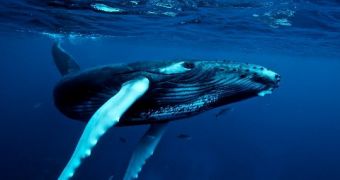A study published just yesterday in the journal Endangered Species Research argues that quite a lot of humpback whales linger in the waters around the Western Antarctic Peninsula well after the arrival of autumn, supposedly in order to feed on the abundant krill they have at their disposal in this part of the world.
This means that, contrary to what marine biologists believed until now, these aquatic mammals start off on their yearly migratory routes much later than previously estimated, otherwise their presence in these waters during this time of the year cannot be explained.
Apparently, most of the humpback whales which decided to stick around and enjoy a few more meals close to the Western Antarctic Peninsula gathered around in sections of Wilhelmina Bay, Andvord Bay and the Errera Channel.
It is believed that these significant changes in the humpback whales' migration patterns can be attributed to climate change and global warming.
As the researchers explain, increased global temperatures are keeping sea ice from reaching these areas within the established timeframe, which means that the whales have no issues in spending a few more days enjoying the perks of this newly available late-season feast.
According to Duke University, David W. Johnston, the lead author for this research into marine demographics, explained how, “The old dogma is that by late autumn, the ice is heading in and the whales have headed out.”
He further added that, “70 percent of our surveying took place in waters with no ice, and we detected 371 groups of humpback whales over a 654-kilometer survey area, with density estimates of up to 1.75 whales per square kilometer.”
It is our belief that, as argued by the marine biologists involved in conducting this research, this new behavior displayed by the humpback whales can indeed be attributed to changes occurring in their natural habitats, changes which in turn can be linked to climate change and global warming.

 14 DAY TRIAL //
14 DAY TRIAL //